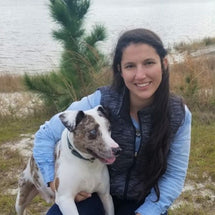What to Look for in the Best Dry Dog Food for Allergies

When your dog has allergies, pet owners will do almost anything to help them feel better. For both food allergies and sensitivities, changing your dog’s diet to a better, high quality dry food can relieve discomfort. Changing your dog’s diet can also improve your dog’s coat and skin quality, reducing the effects of airborne allergies, as well. So, what should you look for in the best dry dog food for allergies? If you’re itching to help your dog feel better, we have some advice that could help your dog feel better.
Understanding Your Dog’s Food Allergies and Intolerances
Food Intolerances vs. Food Allergies
Most dogs have food sensitivities rather than true allergies [1]. True food allergies are relatively rare for dogs. However, the phrases “food sensitivities” and “food allergies” have become relatively interchangeable. So, what is the difference?
A food sensitivity or intolerance occurs when a dog’s body cannot process a certain ingredient.
The symptoms of a food intolerance:
- Diarrhea
- Vomiting
- Gas
- Abdominal pain
- Loss of appetite
- Weight gain or loss
- Itching [2]
- Change in coat condition
The most common dry food elements that dogs can struggle to tolerate include:
- Food additives, including sulphites, monosodium glutamine, and disulphides
- Carbohydrates, including lactose intolerance [3]
A food allergy occurs when a dog’s immune system mistakes an ingredient as dangerous and responds with a heightened reaction of antibodies. Many dog owners don’t realise their dogs are experiencing food allergies, since the symptoms are often the same as an environmental allergy.
These symptoms include:
- Itchy skin, especially the paws, eyes, and ears
- Sneezing
- Rashes, flaky, or oily skin
- Change in skin texture (often rougher or even leathery)
- Red and drippy eyes
- Hair loss and hot spots
- Vomiting and diarrhea
Dog are most often allergic to the following ingredients:
Most Vets Recommend an Elimination Diet for Dog Food Allergies or Intolerances

An elimination diet is often the only way to diagnose a dog with a food allergy and to determine what your dog is allergic to [5]. As the name suggests, you must eliminate your dog’s current food over the course of a week. Slowly replace their current food with a recipe that doesn’t contain the suspected allergen.
It’s a good idea to examine your dog’s current food, whether you feed homemade dry food or prepared meals for any of the most common allergens and common intolerance ingredients listed above and start by eliminating those.
Choosing a new food with a single protein and limited ingredients can help. Your dog will have to remain on their new diet for several weeks to determine if symptoms clear up. Make sure your dog doesn't eat dry food containing the suspected allergen. Some dogs need up to 12 weeks for their systems to rebuild in strength and health.
If your dog’s allergy symptoms continue, you will need to move on to a new food with a different protein and other ingredients. And repeat until your dog’s symptoms disappear.
Your vet can guide you through a stricter elimination diet if needed.
What Are the Best Dry Dog Food for Skin Allergies?
Ultimately, dog foods with limited, wholesome, healthy ingredients and novel proteins are often the best dry dog foods for dog allergies.
A novel protein is often a meat product that is less common, such as kangaroo, duck, venison, rabbit, and fish [6]. These meats work well for dogs with allergies since their proteins will be new to the dog’s body and are therefore less likely to react.
It’s important to note that novel protein dog foods only work well if they do not contain other ingredients that may be allergens.
Is Grain-free Dry Dog Food for Allergies Effective?
While grains have had a bad reputation for quite some time, most high-quality grains are harmless for dogs. When choosing a dry dog food for a doggo with allergies, it’s more important to avoid common proteins, preservatives, and milk rather than eliminating all grain wholesale.
In fact, dogs need some grains in their diet [7].
Other Allergies Dogs Experience
Like us, dogs can be allergic to environmental elements such as dust, mould, pollen, and more. These are often called environmental, airborne, or seasonal allergies. These allergies may flare up more during certain times of the year and most often affect a dog’s paws, ears, and any crevices where allergens may get stuck (like between the toes).
How Can a Change in Diet Improve Your Dog’s Airborne Allergies?
While environmental allergies are not the result of what your dog is eating, having a higher quality diet can improve your dog’s symptoms. When you support your dog’s coat and skin health, the improved diet can do a better job of blocking the allergens from coming in contact with your dog’s skin.
Additionally, supporting your dog’s immune system can reduce the risk of secondary infections caused by scratching and chewing.
Look for these ingredients in the best dry dog foods for allergies caused by environmental triggers:
Scratch That Itch & Eliminate Your Dog’s Allergies

When your dog struggles with food-related allergies, it’s easy to become overwhelmed choosing a new dry dog food. However, if you stick to foods with a novel protein and without additives, your dog’s symptoms are likely to clear up within a few weeks.
Looking for high-quality dry dog food with only the best ingredients? Our Kibble That Counts is made with kangaroo, wholesome, high-quality, limited ingredients, and lots of love.
References:
[3] The Top 7 Most Common Food Allergens For Dogs
[4] Identifying food allergies
[5] Diagnostics & Therapeutic Food Options






